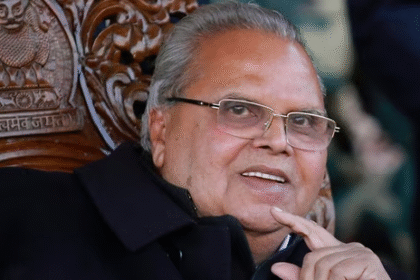Outrage as DU Admission Form Lists ‘Bihari’, ‘Muslim’, and Caste Slurs as Languages
New Delhi: The University of Delhi is at the centre of controversy over its undergraduate admission form, which featured inappropriate caste-related and other entries like Cham***, Mazdoor, Dehati, Mochi, Kurmi, Muslim and Bihari in the mother tongue section instead of languages like Urdu, Maithili, Bhojpuri and Magahi.
The removal of Urdu and the inclusion of ‘Muslim’ as a language in the form gained traction on social media. Alongside Maithili, Bhojpuri and Magahi, Bengali was also allegedly absent from the language section.
The issue was initially brought to light by Professor Abha Dev Habib, secretary of the Democratic Teachers Front (DTF), who vehemently criticised the situation and called it an example of islamophobic and communal mindset.
The All India Forum for Right to Education (AIFRTE) also asked whether one ought to expect the term ‘Hindu’ to replace Hindi as a language soon. Labeling it an ignorant and communal move, AIFRTE has requested a public apology from the university.
The Congress described it as a well-orchestrated conspiracy while the Bharatiya Janata Party (BJP) has called it a ‘human error’.
After widespread backlash and protests, the university clarified its position saying that it was a clerical error that was promptly corrected.
Professor Abu Bakar Abbad, the Head of the Urdu Department at the university, reiterated the university’s explanation regarding the error. He said, “In addition to Urdu, incorrect entries were made in one or two other languages as well, and this has now been rectified.”
Abbad refrained from commenting any further on the matter. However, several other teachers, speaking on the condition of anonymity, suggested that this was, in fact, a well thought-out ‘experiment’ that could not be executed properly.
Had the matter not become public, the intentions of those who are unnecessarily concerned about appeasing the government would have been realised.
When asked about these intentions, they said that they (the administration) wish to maintain a favourable image in the eyes of the government even though they often fail in this regard due to their own ignorance.
The remarks made by Urdu professor and prominent critic Arjumand Ara at the university also suggest that this ‘error’ is, in fact, an ‘experiment’.
Ara said that such ‘absurd things’ have occurred previously as well. “It cannot be deemed an ‘error’ in any respect, and it was not solely with ‘Urdu’ that it was substituted with ‘Muslim’. What sort of individuals have been appointed here who refer to ‘Bihari’ as a language?” she asked.
“The government has filled this place with individuals steeped in ignorance; the ideology of the Sangh is their sole competence, and a peculiar kind of nexus is at work within the university, one that bows down to the government and the BJP,” she added.
Ara said that she did not see this as a clerical error at all. “Clerks are more meticulous in their work; they are aware of their responsibilities,” she said.
Referring to it as an act of ‘sycophants’ engaged in manipulation, Ara said, “Similar to gau rakshak groups, these individuals aim to seize control of the system. They seek various types of information; for instance, last year an experiment was conducted to ascertain the online seating arrangements of students taking the examination.
“They attempted to gather information regarding who occupies which seat in which room, and their team spent six months on this endeavour. An effort was also made to involve educators in this scheme.
“Nevertheless, this too was unsuccessful, thus their attempt to monitor everything and maintain control is part of a larger agenda. All their efforts are directed towards exerting control.
“The authoritarian tendencies of the government are evident in this situation as well. Everyone has assumed a dictatorial role. If one endeavors to comprehend these matters, it becomes clear that this is not merely a ‘clerical error’ but rather a Sanghi agenda,” Ara said.
She believes that there was a definite intention to gather information. However, the lack of expertise in its execution caused the plan to go haywire and it is being downplayed as a clerical error.
In response to the clarification provided by DU, professor Apoorvanand said, “There is no shame, nor any apology! Can such ‘negligence’ be accepted in an institution like DU? Shame has become a relic of the past.”
Apoorvanand also dismissed the adjectives and titles associated with castes and languages as merely a ‘clerical error’, referring to it as a ‘grave mistake’. “If such an error occurs at Delhi University, which is a hub of education, it warrants serious consideration,” he said. “It is profoundly careless given the institution’s assertion of delivering top-tier education. Even if we accept its claim that there was no ulterior motive, it is still negligence of the highest order.”
“The administration failed to apologize, did not show any regret, and merely referred to it as a ‘clerical error’. This indicates a lack of understanding regarding the gravity of the situation. The gravity of the situation lies in the question of how such errors can occur. It necessitates an investigation and accountability must be established,” he added.
He asked how ‘Urdu’ could be categorised as ‘Muslim’ or how a language can be designated as ‘Bihari’.
In his opinion, this has been executed with intent. He said, “This is not a matter of chance, as when you classify Maithili and Magahi as Bihari, it becomes exceedingly hard to accept that this is merely a ‘clerical error’. This is a form of malice. An error could be a misspelling of ‘Urdu’ or writing Maithili as ‘Mithila’, but if you use terms like ‘Muslim’ and ‘Bihari’, it signifies that this was done purposefully, or that there are no competent individuals at Delhi University.”
The use of casteist language was even more concerning he said, highlighting the casteist frustration, division and discrimination that emerges in various forms at the slightest opportunity.
Rajya Sabha MP and Rashtriya Janata Dal leader Manoj Kumar Jha deemed the incident regrettable and said that he was unwilling to accept it as a mere ‘clerical error’.
Referencing his experience at this university, he said, “I am aware of the extensive effort involved in preparing any form. Thus, I cannot endorse such an explanation.”
Voicing his apprehension regarding a recent remark made by Union home minister Amit Shah regarding English-speaking individuals, Jha said, “What have we come to? If you can accurately interpret the statement issued by the Hon’ble Home Minister, a distinct type of connection can be observed within it.’
Shah on June 19 had said that individuals who speak English in India will soon feel ashamed, and that the creation of such a society was not far away.
Coincidentally, this happened on the very day that the admission form for Delhi University was made available, on which Jha said, “In a multilingual nation like India, language is never tied to a specific community. The prevalence of any one language in this diverse country is detrimental to its democratic and cultural integrity. This nation is characterised by linguistic diversity. I have repeatedly stated that this is not an issue to be resolved, but rather a heritage to be celebrated.”
“It saddens me deeply that we need to comment on such matters in our public discourse,” he added.
Conversely, When asked about referring to the languages of Bihar as ‘Bihari’, a faculty member from DU said, ‘This error originated during the colonial era, when George Abraham Grierson attempted to make that claim. However, Grierson himself noted that he had presented this merely as a theoretical concept. In reality, Bihari is not a language.’
“How should this recent incident be interpreted, especially considering the numerous riots that have taken place in this country over language and religion? It would be overly simplistic to dismiss it as a ‘clerical error.’
Those in positions of power are present, yet they lack a grasp of history, language, and politics. Notices are issued here every few days that lack any logical basis, only to be retracted later. What accounts for such disorganisation? One might say that there is an owl perched on every branch… The university has been deliberately destroyed. It has become increasingly challenging for us to articulate our thoughts,” the professor said.
In the midst of this criticism, there is also a perception that it aims to incite communalism and advance the agenda of the Sangh. Nevertheless, a crucial question remains: Will the university have the courage to investigate the matter and explain how multiple offensive ‘clerical errors’ occurred at the same time?
Also Read: Global Markets Tumble: 5 Key Reactions to U.S. Strikes on Iran and What Traders Fear Most







